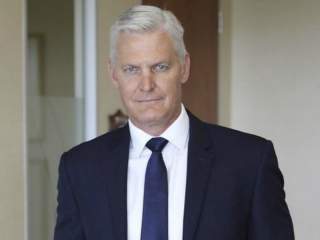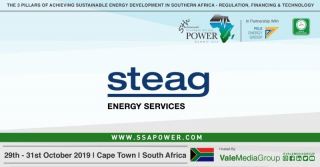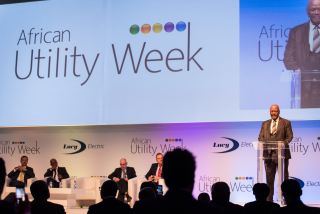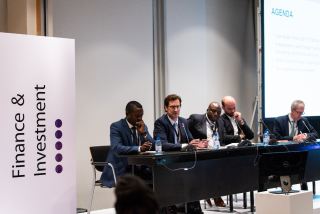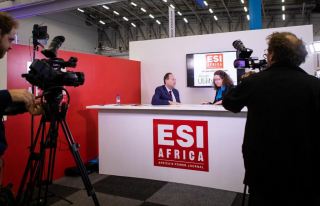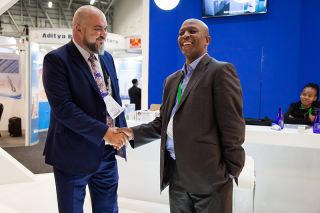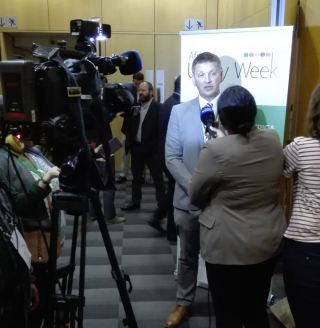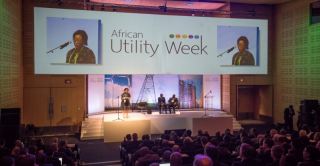Enlit Africa confirms sit-down with Eskom GCE André de Ruyter in October
Leading power platform to focus on preparation for COP26
The organisers of Enlit Africa have confirmed that Eskom Group Chief Executive André de Ruyter will once again be part of the opening session of the event on Tuesday morning, 26 October. The leading platform and discussion forum for the power and energy sector on the continent will specifically focus on how the UN Climate Change Conference (COP26), taking place in November, could provide the launchpad for Africa’s energy transition.
Formerly known as African Utility Week, Enlit Africa is unpacking what the continent needs to concentrate on to decarbonise the power sector. Running from 26–28 October, Enlit Africa will provide practical solutions to prepare the continent for a NetZero reality. The programme looks at various ways to achieve this; from LNG as a transitional energy source, municipal energy independence, e-mobility, and how Africa is preparing for, and what it is expecting from, the COP26 summit.
During the Mr de Ruyter’s keynote appearance at a previous edition of the event, he shared Eskom’s long-term strategy, discussed the utility’s plans for decommissioning existing coal stations and repurposing the infrastructure, as well as moving into renewable energy. During the keynote session in October this year, the Eskom GCE will give more insight into Eskom’s COP26 journey and the anticipated outcomes.
Other confirmed industry experts appearing in the Enlit Africa sessions are:
- Meike Wetsch, programme manager, Coega Development Corporation, South Africa
- Dhevan Govender, senior commercial & business manager, eThekwini Municipality, South Africa
- Adrian Strydom, executive director, SA Oil and Gas Alliance
- Frederic Verdol, senior energy expert: energy & extractives, World Bank
- Vally Padayachee, special advisor, Association of Municipal Electricity Utilities
- Jessica Stephens, CEO, AMDA, Kenya
- Roland Nkwain Ngam, programme manager: climate justice and socio-ecological transformation, Rosa Luxemburg Foundation, South Africa
- Patrick K. Tonui, head of policy and regional strategy, GOGLA, The Netherlands
Enlit Africa session highlights will include:
- Keynote session: How COP26 could provide the launchpad for Africa’s energy transition.
- To LNG or not: Is that the question?
- Municipal Energy Resilience in South Africa - assisting local government to take advantage of new energy regulations, including purchasing energy directly from IPPs.
- E-mobility: Creating a regulatory and policy environment to encourage EV uptake.
- Prepayment as a precursor to enhanced energy and financial efficiency.
- Digital equity: Ensuring that digital advances are equitable and just.
- Energy storage: Generation, transmission or distribution asset?
- Finance, investment and strategy: Is there an oversupply of funding and an undersupply of projects?
- ROUNDTABLE: Heading to COP26: Has the COVID-19 crises derailed the climate finance agenda?
- Waste not, want not: re-use, recycle and reclaim your wastewater.
- Water security 2.0: Looking Durban’s experience in addressing monumental water challenges.
Gathering the industry
Formerly known around the continent as African Utility Week and POWERGEN Africa, Enlit Africa has been connecting the utility industry on the continent for more than two decades and in the next edition will also bring back its popular water track. October’s digital edition is a precursor in the lead-up to the hybrid event in Cape Town in June next year.
In tune with this year’s theme, leading power and event media partner ESI Africa will highlight the leaders and projects nominated to the African Power & Energy Elites annual publication. During the Enlit Africa digital event in October, the finalists who will appear in the 2022 edition of the Elites publication will be announced.
Enlit Africa’s successful transition to digital
The fast-growing attendee numbers and feedback from participants and partners fully support the remarkable and successful transition that the organisers of the event have made from live events to providing a digital forum for the industry to connect via live, online events on the Enlit Africa-Connect platform.The June edition of the event, the third in the last 18 months, attracted more than 5,000 registered attendees, representing more than 70 countries and featuring 50 speakers.All the previous Enlit Africa sessions remain available on demand on the event platform.
For access, register on the Enlit Africa-Connect platform by clicking here.
Industry support
Eskom, the Department of Mineral Resources and Energy and the City of Cape Town have been official hosting partners of the event for many years and 2021 is no exception.
ESI Africa, the continent’s leading news provider for power and energy news, is the official host publication.
Enlit Africa is organised by Clarion Events Africa, a multi-award-winning Cape Town-based exhibition and conference producer across the continent in the infrastructure, energy and mining sectors. Other well-known events include Nigeria Mining Week, Africa Mining Forum and DRC Mining Week.
Enlit Africa dates and venues:
Digital Event: 26–28 October 2021
Next live, in-person conference and exhibition: 7–9 June 2022
Venue: CTICC, Cape Town, South Africa
Website: www.enlit-africa.com
Eskom to deliver the world’s most visible electricity grid
Cape Town: South Africa’s energy utility Eskom awarded its National Power Grid Intelligence Tender to Actom Smart Technology (Pty) LTD, who will be deploying Stellenbosch based CT LAB (Pty) LTD technology to deliver a world first in power grid technology.
The agreement will see Eskom install over 1,300 of CT LAB’s OTELLO edge computing devices into the power grid countrywide to upgrade grid monitoring and management capabilities in four provinces.
Once completed, CT LAB’s state-of-the-art OTELLO devices will join 3,600 of CT LAB’s existing power quality monitoring devices, to create the first integrated smart grid monitoring and intelligence platform that delivers real-time, grid-wide visibility to grid engineers and managers. The OTELLO system is the only intelligent grid monitoring and control solution on the market to install processing power throughout the power grid, preparing the way for Eskom to transition to a distributed smart grid management paradigm.
“OTELLO was developed to address the unique needs of the African power grid,” said Willie van Wyk, CEO of CT Lab and lead engineer on the OTELLO platform. “The challenges of delivering continuous, high quality power to the continent requires an innovative approach to monitoring. OTELLO focuses on bringing visibility to the edge of the network through the power of edge computing and broadband connectivity. We are honoured to be awarded this tender and excited to play a role in upgrading South Africa’s power network.”
“When assessing the proposals put forward within this tender, CT Lab’s innovative approach, cost-effective devices and comprehensive offering stood apart, even from some steep international competition. We look forward to enhancing the delivery of services to our communities with CT Lab,” said Thabeka Sonelu, chairperson of Eskom’s tender committee.
The first phase of the project will see 300 devices installed from Ezulwini Hydroelectric Dam to substations across the greater Gauteng area.
About CT Lab
Established in 1993 in Stellenbosch, CT LAB has focused on delivering power engineering solutions aimed at solving Africa’s power quality and continuity needs. Now expanding into the EU, Canada and Australia, CT LAB’s flagship OTELLO platforms is unique in delivering smart processing power throughout the grid, and has the potential to play a significant role in responsibly integrating renewable power resources into grids the world over.
Hydrogen, financing the energy transition and climate change in focus at high-level discussions at Enlit Africa next month
Can Africa carve out a role for itself in the burgeoning hydrogen market? How do cities climate proof their energy sectors and water systems? Where will the funding come from for the 5Ds of the energy transition?
These are just some of the pertinent questions and topics up for discussion during the upcoming Enlit Africa, taking place from 8 to 10 June, featuring live sessions with the sector’s leading minds. The online platform will be opened with a welcome address by South Africa’s mineral and energy resources minister, Gwede Mantashe.
Hydrogen
“Countries such as South Africa and Kenya already have the infrastructure in place which can be leveraged to take advantage of green hydrogen both for production and export,” says Hendrik Malan, partner and Africa CEO at Frost & Sullivan Africa and moderator of the upcoming session on: The role of Africa in the global hydrogen-generation market.
“Hydrogen, specifically green and blue,” he explains, “has the potential to considerably accelerate sub-Saharan Africa’s electrification rate. Furthermore, through export of this green resources, local economies can be strengthened, driving job creation, and establishing countries as key suppliers ahead of the rest of the world.”
According to Malan, while hydrogen is still in the R&D and early implementation phase, governments already need to put the respective legislation and regulations in place to enable fast implementation.
Climate change
Climate change and its effect on the future of the energy sector is a critical theme that forms a thread throughout the Enlit Africa programme. From the opening session’s panel that will focus on the 5Ds of the energy transition – namely decarbonisation, decentralisation, democratisation, digitalisation and deregulation – to how African governments are currently devising their own climate change policies.
“We all know that the global community has decided to cap global warming at 1.5 degrees. The consequences of an overshoot are too catastrophic to contemplate and so we need to invest more in adaptation strategies,” says Dr Roland Nkwain Ngam, programme manager for climate justice and socio-ecological transformation at the Rosa Luxemburg Foundation.
Ngam, who is speaking in the Climate finance - adaptation and mitigation session, adds: “Coal power is killing us and we need to force polluters to pay their fair share for adaptation activities.”
Enlit Africa will also feature an exclusive interview with City of Cape Town executive director Kadri Nassiep on how the City of Cape Town is addressing climate change.
More exciting speakers and moderators on the programme include:
- Ashish Khanna, Practice Manager: West and Central Africa, World Bank, USA
- Sabine Dall'Omo, CEO, Siemens, South Africa
- Dr Albert Butare, a former Minister of State for Infrastructure in the Republic of Rwanda and currently the CEO of Africa Energy Services Group Ltd
- Gillian-Alexandre Huart, CEO, ENGIE Energy Access, Belgium
- Dr Jarrad Wright, Principal Researcher, Council for Scientific and Industrial Research (CSIR), South Africa
- Mandy Rambharos, GM: Just Energy Transition Office, Eskom, South Africa
- Ashish Kumar, Head of Innovation, Shell Foundation, United Kingdom
- Tobi Busari, Team Lead: Embedded Generation and Renewable Energy, Ibadan Electricity Distribution Company, Nigeria
Further session highlights at Enlit Africa:
- The realities of incorporating small scale embedded generation (SSEG) into a local distribution grid
- The business case for a circular economy
- Training: Fundamentals of PV systems with energy storage
- Managing revenue losses – Nigeria’s turnaround in collections despite a challenging economic environment
- How solar PV is changing the commercial and industrial energy landscape
- Bringing renewables onto the grid: G-PST Consortium presentation
- Case study: Preparing for how mini grids meet the national grid
- How gas can enable the decarbonisation of the power sector in sub-Saharan Africa
- Interview: The first solar IPP in Burundi
All content will also be available on demand following the live broadcasts.
Same inspiration, different look
Enlit Africa, taking place from 8 to 10 June, is the new brand for the Cape-town based African Utility Week and POWERGEN Africa conference and exhibition, which for more than 20 years has been the flagship power and energy show for the continent’s energy sector. The event had two very successful, interactive digital editions last year and rebranded in November 2020.
Industry support
Eskom, the Department of Mineral Resources and Energy and the City of Cape Town have been official hosting partners of the event for many years and 2021 is no different.
Global and local top technology and services suppliers to the industry, including Siemens, IFS, SAS, G3-PLC, GE, Toshiba and Conlog are returning as sponsors at Enlit Africa. Other industry supporters are Prime Alliance, WESGRO, City of Cape Town, and Ntiyiso Consulting and many more.
ESI Africa, the continent’s leading news provider for power and energy news, is the official host publication while the Enel Foundation is back as the knowledge partner.
Enlit Africa is organised by Clarion Events Africa, a multi-award-winning Cape Town-based exhibition and conference producer across the continent in the infrastructure, energy and mining sectors. Other well-known events include Nigeria Mining Week, Africa Mining Forum and DRC Mining Week.
Enlit Africa dates and venues:
Digital Event: 8 - 10 June 2021
Next live, in-person conference and exhibition: 7 – 9 June 2022
Venue: CTICC, Cape Town, South Africa
Website: www.enlit-africa.com
Media contact:
Annemarie Roodbol
Email: This email address is being protected from spambots. You need JavaScript enabled to view it.
STEAG #Energy Services confirm as Roundtable Sponsor for #SSAPOW19
STEAG GmbH Energy Services confirm as Roundtable Sponsor for the upcoming 5th Annual Southern Africa Power Summit 2019! #SSAPOW19
“THE 3 PILLARS OF ACHIEVING SUSTAINABLE ENERGY DEVELOPMENT IN SOUTHERN AFRICA – REGULATION FINANCING & TECHNOLOGY”
The Southern Africa Power Summit hosted by Vale Media Group, the number 1 Africa Focused B2B events company, will provide a platform to address some key challenges of improving ageing power infrastructure, developing new power infrastructure, renewable power innovations, gas to power technologies, transmission & distribution solutions, more cost effective temporary power solutions and much more.
We will bring together Ministries of Power & Energy, State Power providers, Public – Private partnerships (PPP), Independent Power Producers (IPP’s) and key solution providers to tackle some of the most pressing issues within the African Power industry. In the Sub Continent region power companies will be looking toward the strategy for increased power capacity: Eskom, ZESCO, Electricidade de Moçambique (EdM), NamPower, TANESCO, Southern African Power Pool, Botswana Power Corporation, SNEL, RNT and many more.
29th -31st October 2019, The Vineyard Hotel, Cape Town.
For more information contact This email address is being protected from spambots. You need JavaScript enabled to view it. or go to www.ssapower.com
African Utility Week and POWERGEN Africa partners with South African Ministry of Energy
Energy Minister Jeff Radebe to present event keynote address again in May
The organisers of the African Utility Week and POWERGEN Africa conference and exhibition, taking place in Cape Town from 14-16 May 2019, have announced a four-year partnership with the South African Ministry of Energy. The South African Minister of Energy, Honourable Jeff Radebe, is heading up a stellar line up of expert speakers and will once again deliver the opening ministerial address at the event on 14 May.
“Since his appointment, Minister Radebe has shown visionary and passionate leadership in terms of energy security, something that resonates greatly with our African power community” says African Utility Week and POWERGEN Africa event director Evan Schiff, “and we look forward to welcome him back to the event to hear his message.”
He adds: “the potential of renewable energy sources such as solar, storage solutions and mini-grid generation projects are just some of the exciting focus areas at this year’s African Utility Week and POWERGEN Africa and we expect more than 10 000 energy and water professionals from across Africa and the world to gather in the Mother City. Renewing our previous successful four-year partnership with the Energy Ministry allows us to further entrench South Africa’s leading role on the continent and within the international power community.”
“African Utility Week and POWERGEN Africa never disappoints with compelling content, inspiring speakers and the latest technology offerings” says the Department of Energy, adding that it looks forward to “another fruitful four-year partnership and taking valuable strides in our vision for a sustainable approach to South Africa’s energy deficit.”
African Utility Week and POWERGEN Africa is the flagship energy event organised by Spintelligent, a multi-award-winning Cape Town-based exhibition and conference producer across the continent in the energy, infrastructure, mining and agriculture sectors. Other well-known events by Spintelligent include Future Energy East Africa, Future Energy Nigeria, the Utility CEO Forums, Agritech Expo Zambia, Nigeria Mining Week and DRC Mining Week. Spintelligent is part of the UK-based Clarion Events Group and African Utility Week and POWERGEN Africa form part of Clarion Energy, which runs over 40 events that cover the oil, gas, power and energy sectors, making it one of Clarion Events’ largest portfolios.
Dates for African Utility Week and POWERGEN Africa:
Conference and expo: 14-16 May 2019
Site visits: 17 May 2019
Location: CTICC, Cape Town, South Africa
Website: http://www.african-utility-week.com
Twitter: https://twitter.com/AfricaUtilities #AUW2019
Linkedin: African Utility Week
Contact:
Senior communications manager: Annemarie Roodbol
Telephone: +27 21 700 3558
Mobile: +27 82 562 7844
Email: This email address is being protected from spambots. You need JavaScript enabled to view it.
Financing energy projects in Africa: “the traditional business model needs to change”
African Utility Week and POWERGEN Africa to gather 10 000+ in Cape Town in May“
Honestly, I think the business model for energy investment needs to change” says Penny Herbst, Director Strategy for Africa GreenCo. “There are far too many players that are comfortable with the same structures for investment, selling to an SOE (state-owned enterprise) with a government guarantee. What we really need at present is for investors to have a stake where their influence contributes to improving the Electricity Supply Industry (ESI) as a whole. Both current investors familiar with the South African environment and those that wish to enter the market for the first time are awaiting the release of the revised IRP for their next move.”
She explains that Africa GreenCo has an innovative business model “where it will function as an intermediary buyer and seller of power from IPPs and in this role will aggregate financial and supply risks in a portfolio approach by, amongst others, using local and regional markets to transparently diversify its risks.”
Municipalities part of ESI
With regards to the role of municipalities, Ms Herbst, who is a former Eskom employee and 30-year veteran of the energy industry, says: “the municipalities are as much a part of the ESI as Eskom and as a matter of fact, in most large metros they add a margin in excess of 100% to Eskom’s tariff e.g. Eskom charges the municipalities approximately ZAR 1 / Wh and they in turn charge ZAR 2+ / kWh to their customers. This is exorbitant and to make matters worse the charges associated with pre-paid exceed those of post-paid. Surely pre-paid customers are a better credit quality than those that are being billed in arrears. The question to be raised here is who is benefitting from pre-paid meters, if it is the private sector, is their remuneration commensurate with their risk?”
She adds: “what is clear though is that there is a myriad of players lying in wait to capitalise on the gap that has been created by the unfolding Eskom financial and reliability challenge. Can we as a country honestly say that the planning and pricing impact for this has been fully comprehended?“
Ms Herbst will moderate a conference session on “Financing renewable energy projects” at the upcoming African Utility Week and POWERGEN Africa in Cape Town from 14-16 May. Click here to read her full interview: An electricity sector in turmoil - Unpacking what transpired.
Educating investors on risk
“We are seeing greater interest from international investors than we have in the past” says Romain Py, Investment Director – Head of Transactions, African Infrastructure Investment Managers Pty Ltd (AIIM). “It is, however, important to note that the African private equity industry is still at an early stage of development relative to the traditional markets. As a result, the key focus for the industry needs to be on educating investors, notably on how to manage risks, and the large gap between perceived risks and actual residual risks for deals.”
AIIM is a shareholder in the Albatros Energy Mali project which won Project of the Year at the African Utility Week Industry Awards last year. Albatros Energy Mali, an HFO thermal power station, is Mali’s first independent power producer (IPP) project. Py adds: “There is also a need to educate governments on the requirements for increased private sector participation and consistency of policies and regulation. Reforms have been enacted in some countries in order to encourage Africa-based institutional investors to allocate capital to the asset class. However, more remains to be done to fully harness private equity’s potential to contribute to Africa’s socio-economic development.” For Romain Py’s full interview click here.
This year’s African Utility Week and POWERGEN Africa dedicates a full three-day conference track to investment and finance in the energy sector. AIIM’s Romain Py is part of a panel discussion on: “What impact will the financial and investment landscape for 2019 have on Africa’s power infrastructure?”
Mini grids, deregulation
“Deregulation would open a market for people to produce power and sell power and that would revolutionise the energy landscape in South Africa. Technically it wouldn’t be a difficult or complex thing to do; there are plenty of precedents around the world where it has worked really well” – this is according to says Dr Sam Duby, Africa Director for TFE Energy and mini grid expert.
He continues: “creating a market for independently produced energy would also very quickly incentivise and unlock investment into the space. As more projects were built and generation capacity added, you would also very quickly get more system resilience. Blackouts really could be a thing of the past.“
At African Utility Week and POWERGEN Africa in May, Dr Duby will address the Energy Revolution Africa conference session on the latest developments and long-awaited cooperation in the African micro grid industry. See more from Dr Duby here.
The 19th edition of this leading conference and exhibition is expected to attract more than 10 000 energy and water professionals this year.
African Utility Week and POWERGEN Africa is the flagship energy event organised by Spintelligent, a multi-award-winning Cape Town-based exhibition and conference producer across the continent in the energy, infrastructure, mining and agriculture sectors. ESI Africa is the longstanding host publication of the event. Other well-known events by Spintelligent include Future Energy East Africa, Future Energy Nigeria, the Utility CEO Forums, Agritech Expo Zambia, Nigeria Mining Week and DRC Mining Week. Spintelligent is part of the UK-based Clarion Events Group and African Utility Week and POWERGEN Africa form part of Clarion Energy, which runs over 40 events that cover the oil, gas, power and energy sectors, making it one of Clarion Events’ largest portfolios.
Dates for African Utility Week and POWERGEN Africa:
Conference and expo: 14-16 May 2019
Site visits: 17 May 2019
Location: CTICC, Cape Town, South Africa
Website: http://www.african-utility-week.com
Twitter: https://twitter.com/AfricaUtilities #AUW2019
Linkedin: African Utility Week
Contact:
Senior communications manager: Annemarie Roodbol
Telephone: +27 21 700 3558
Mobile: +27 82 562 7844
Email: This email address is being protected from spambots. You need JavaScript enabled to view it.
ESI Africa on load-shedding: knowledge is power!
ESI Africa premium media partner at African Utility Week & POWERGEN Africa
"Whether you want to call it load-shedding, a blackout, load-shifting or load sharing, remember that this affects everyone. We are in this together so join your neighbourhood Whatsapp or Facebook group to stay informed.” So says Nicolette Pombo-van Zyl, editor ESI Africa, a leading energy industry journal.
Off the grid
“It is not really viable at this stage for the average suburban household to go completely off the grid to avoid the effects of load-shedding” says Mrs Pombo-van Zyl, adding “but, it is possible to develop a back-up plan for when the grid goes down. The ideal option is solar PV but this requires an investment, which will eventually pay off in the long run. One could just invest in a solar water heater system or take the route of rooftop solar with a battery storage unit.”
“Back-up generators are also an option, especially for businesses although they can be noisy and cumbersome to set up and prove dangerous for people not familiar with this type of equipment. Another off-grid option is to change to gas for cooking and lighting.” She continues: “some people may think that they are experiencing load-shedding when in actual fact their main has tripped. Invest in battery-operated torches and lighting and regularly check the batteries. Ensure that your mobile phones are charged. Also be more vigilant when driving as a lot of traffic lights are affected.”
ESI Africa at African Utility Week
The potential of renewable energy sources such as solar, storage solutions and mini-grid generation projects are some of the exciting focus areas at African Utility Week and POWERGEN Africa taking place from 14-16 May in Cape Town. The South African Minister of Energy, Honourable Jeff Radebe, is heading up a stellar line up of expert speakers and will once again deliver the opening ministerial address on 14 May. The 19th edition of this flagship conference and exhibition is expected to attract more than 10 000 energy and water professionals this year.
ESI Africa is the longstanding host publication of the event and also has an onsite studio on the expo floor to interview dozens of experts for its online portal. Says ESI Africa’s editor Nicolette Pombo-van Zyl: “this annual event is marked in my diary as a ‘must-attend’ to meet with industry stalwarts and the up-and-coming young leaders. I’m keenly looking forward to three intense days of on-point conversations around what’s happening in the industry, what to expect in the coming year, and the solutions driving development. Also, as a moderator for one of the conference sessions, I’m excited by the prospect of debating risks and opportunities in a way that could very well deliver a primed solution to the attending delegates who have travelled from far and wide.”
She continues: “it’s going to be another superb year for the ESI Africa team as our bumper issue of the journal is being distributed in the delegate bags and VIP areas. As the official host publication, ESI Africa is the only media house with an onsite studio where on-camera interviews will be conducted over the three days of African Utility Week & POWERGEN Africa. Another activity is our sought-after roving camera team who will be visiting expo booths that have pre-booked an interview with us.”
The ESI Africa television studio is strategically positioned on the exhibition floor for easy access, says Nicolette: “this is where our team of editors will conduct professional on-camera interviews with conference speakers, VIP guests, and profiled attendees to reap their industry knowledge for our readers’ benefit.
“You can also rely on the editorial team to keep you posted on what’s happening as they will be reporting live from the conference sessions using the ESI Africa social media channels and website. We’re interested in connecting with as many people as possible, so look out for the team at the networking sessions, awards gala, and knowledge hubs.”
African Utility Week and POWERGEN Africa is the flagship energy event organised by Spintelligent, a multi-award-winning Cape Town-based exhibition and conference producer across the continent in the energy, infrastructure, mining and agriculture sectors. Other well-known events by Spintelligent include Future Energy East Africa, Future Energy Nigeria, the Utility CEO Forums, Agritech Expo Zambia, Nigeria Mining Week and DRC Mining Week. Spintelligent is part of the UK-based Clarion Events Group and African Utility Week and POWERGEN Africa forms part of Clarion Energy, which runs over 40 events that cover the oil, gas, power and energy sectors, making it one of Clarion Events’ largest portfolios.
Dates for African Utility Week and POWERGEN Africa:
Conference and expo: 14-16 May 2019
Site visits: 17 May 2019
Location: CTICC, Cape Town, South Africa
Website: http://www.african-utility-week.com
Twitter: https://twitter.com/AfricaUtilities #AUW2019
Linkedin: African Utility Week
Contact:
Senior communications manager: Annemarie Roodbol
Telephone: +27 21 700 3558
Mobile: +27 82 562 7844
Email: This email address is being protected from spambots. You need JavaScript enabled to view it.
Energy and water sectors excited by solar PV, technology innovation and distributed generation but view corruption as biggest challenge
African Utility Week industry survey yields interesting results
Solar PV is overwhelmingly seen as the most promising generation source for Africa while corruption, skills gaps and access to finance are some of the biggest challenges that power and water professionals face in their industries. This is according to a survey by the organisers of African Utility Week among attendees of the annual event in Cape Town last year. Other questions in the survey included what respondents think will have the biggest impact on the energy and water sectors, what future technology excites them and what the biggest challenges are that they face in their industry.
Of the 834 people surveyed, 696 are South African (71%), 199 are from 24 other African countries (63 Kenyan, 85 Nigerian) and 40 from the rest of the world, including Europe, USA, China, India and Canada.
Most promising generation source
Asked what the most promising source of generation is for Africa, Solar PV scored more than 54% amongst the respondents while nuclear was second with 11%. “The reason could be that rooftop PV, when measured against the other technologies, is easy to execute as a project and photovoltaic modules are becoming very affordable,” says Nicolette Pombo-van Zyl, editor of the energy trade journal, ESI Africa.
She adds: “it is also the most obvious technology to use in mini- and off-grid projects as well as for use in hybrid models. However, what is interesting but not surprising is that 11% of respondents feel that nuclear energy is the most promising generation source. Nuclear has its merits. What is disappointing is how few are in favour of biomass as a promising source of generation capacity, considering that this technology offers a distributed model and a measure of reducing the mounds of waste that Africa’s cities are confronted with. Another concern is the lack of interest in wind energy – only 8% of respondents felt this technology a worthy source; however, it does rank slightly higher than hydro where the continent’s impressive potential capacity is recorded. Wind energy is likely to make tentative steps towards market growth now that South African, Kenyan and Moroccan wind farms are making good headwinds.”
Nuclear scored the lowest amongst power and water professionals when asked what they think will have the biggest positive impact on the energy and water sectors in Africa within the next 5-10 years: (Respondents were allowed to select more than one of the 12 options provided.)
- Technology innovation 59%
- Government commitment and transparency 55%
- Uptake of renewables 47%
- Expansion of mini grids 28%
- Distributed generation 25%
- Cross border partnerships 24%
- Investment in capacity building 21%
- Local investment 21%
- Direct foreign investment 20%
- Roll out of ICT systems 9%
- Nuclear 7%
“Even though nuclear made a spectacular appearance in the previous question, here it ranks lowest, with technology innovation taking the prime spot” says ESI Africa’s editor, adding that “Tech R&D in all spheres of energy, power and water are already advancing with enthusiasm. And sometimes the simplest of solutions can be developed for the specific needs of a local community making the most impact. This is made possible by various organisations that are investing in entrepreneurship programmes and providing support to local innovators.”
She continues: “the other key area that respondents are hopeful will make a positive impact is around government’s commitment and transparency. Now that there has been an increase in public and industry association monitoring groups, such as OUTA and SAWEA, along with the ongoing Eskom Inquiry and South Africa’s leadership changes – this area is set on the right path to make a noteworthy impact.”
Future technology
Asked which future technologies most excite the respondents, the results were as follows:
- Smart Grids 54%
- Energy storage 49%
- Energy trading 49%
- Connected/smart cities 37%
- Electric vehicles 36%
- Energy trading 14%
- Blockchain 14%
“These results show an interesting grouping around smart grids, energy storage and energy efficiency, which are intrinsically connected,” says Nicolette Pombo-van Zyl. “It’s disappointing that energy trading and blockchain are perceived as too futuristic to be the technology that respondents are most excited about. The African continent was able to leapfrog landline telephony straight to mobile; countries can do this again by becoming the leaders in energy trading and the use of crypto currency to fund projects and transact in the utility, energy and water space.”
That the market has a healthy appetite for the futuristic technology was confirmed in a separate question whether the market is ready for the digital utility with a focus on smart meters, grids, Internet of Things and ICT – the overwhelming reply was a yes from 84% of the respondents.
Biggest challenge = corruption
At 49%, corruption was indicated as the biggest challenge that power and water professionals face in their industries but issues such as skills gap, access to finance, regulation and policy clarity, red tape and economic slowdown were also perceived as important hindrances, scoring from 36% to 28%.
Says the ESI Africa editor: “corruption is still perceived as a major obstacle and this goes along with respondents’ strong call for government commitment and transparency. It will take concerted leadership from all levels of government to rid the continent of this deeply entrenched challenge. The skills gap is also pinned as a high concern, putting development at risk – the loss of engineers, technicians and managers who are now retired or close to retirement age is a real factor; perhaps reviving apprenticeships along with attractive offers would make inroads to solving this risk.”
The future lies in…
When asked the question: “The future lies in:” and given four choices only, namely distributed generation, mini grids, utility scale grids and storage, distributed generation was a clear winner at 40% with storage second at 27%, then mini grids with 22% and utility scale grids scoring the lowest with 11%.
According to Pombo-van Zyl, distributed energy resources (DER) are top of mind as an imminent risk to the traditional utility and municipality business model – and not just in Africa. She explains: “it is being discussed at all levels of the utility business from its executive boards to internal auditors as it poses a threat to traditional revenue streams. However, the good news is that utilities have acknowledged a future that includes distributed generation – the challenge is in how to manage the technicalities around accommodating this on the national grid and its impact on revenue.”
She adds: “it must have been a tough choice for survey respondents to choose between distributed energy, mini grids, utility-scale grids and storage. This is evident in the close percentages, with the obvious outlier being utility-scale grids; probably due to grid connected generation having made little inroads on increasing electrification rates across the continent.”
Skills deficit in power and water sectors
Skills in finance, engineering/technical, people management and leadership all scored high (29%-33%) in a question on what power and water professionals perceived to present the biggest skills deficit in their companies. The ESI Africa editor’s take on these results: “it is a concern that there is a joint winner from this question: finance and engineering/technical skills. Without these two significantly important skills being resident within the utility market it is no wonder that companies’ cash flow is untenable and technical losses along the value chain are present due to maintenance challenges. A potential solution lies in leadership and people management, which also scored very high in this question.”
Award-winning energy platform
The 18th annual, multi-award winning African Utility Week will gather over 7000 decision makers from more than 80 countries to discuss the challenges, solutions and successes in the power, energy and water sectors on the continent. Along with multiple side events and numerous networking functions the event also boasts a seven track conference with over 300 expert speakers.
The African Utility Week expo offers an extensive technical workshop programme that is CPD accredited, free to attend, and offers hands-on presentations that take place in defined spaces on the exhibition floor. They discuss practical, day-to-day technical topics, best practices and product solutions that businesses, large power users and utilities can implement in their daily operations.
Industry support
African Utility Week has already secured important industry support including Eskom Rotek Industries, Hexing and Landis+Gyr as platinum sponsors and Aberdare, Africa Utility Solutions, SAP and Sensus as gold sponsors.
Dates for African Utility Week:
Conference and expo: 15-17 May 2018
Awards gala dinner: 16 May 2018
Site visits: 18 May 2018
Location: CTICC, Cape Town, South Africa
Website: http://www.african-utility-week.com & www.african-real-estate-summit.com
Twitter: https://twitter.com/AfricaUtilities #AUW2018
Linkedin: African Utility Week
Contact:
Senior communications manager: Annemarie Roodbol
Telephone: +27 21 700 3558
Mobile: +27 82 562 7844
Email: This email address is being protected from spambots. You need JavaScript enabled to view it.
Nuclear expert says nuclear build’s contribution to South Africa’s GDP will be “staggering”
“How all these energy sources can complement each other”
“Nuclear energy is certainly not any more expensive than any other energy source” says nuclear expert Dr Anthonie Cilliers, explaining that “the large 9600MW nuclear programme has created an impression of a single expensive mega-project, when in fact the purpose of the fleet approach was to drive down costs over time and increase the learning rate. This should be broken up into smaller chunks, for example, should two nuclear reactors be added to the current plant at Koeberg, the cost would be no more than the guarantees already provided by treasury for the current IPP programme, whilst two nuclear reactors would produce more units of electricity per year (and more reliably) than the units on the IPP programme.”
He adds: “I agree that South Africa’s fiscus is constrained at the moment, I believe this will change and when it does we need to be prepared. If we cannot afford nuclear new build we cannot afford any new build. We also have to remember that the new IRP has not been gazetted and with an outdated IRP, I find the approval of any energy projects (including nuclear) irrational.”
Nuclear Power Africa
Dr. Anthonie Cilliers is the National Coordinator of SAN-NEST (South African Nuclear Education, Science and Technology) the R&D Programme Manager: Advanced High Temperature Reactor (AHTR) and Honorary Research Fellow at the University of the Witwatersrand. A regular commentator and speaker at African Utility Week, he returns this year as a panellist during the Nuclear Power Africa conference at the event from 15-17 May in Cape Town.
“Nuclear is certainly part of the energy mix in Africa” says Daniel Njoroge Butti, Energy Economist at the Karatina University in Kenya, another expert who will share his views at African Utility Week and asked whether there is appetite for investors to fund nuclear energy projects, he replies: “the definitive answer is YES.”
With regards to costs he explains that “in my view, nuclear energy has significantly high initial costs but very low operating costs vis a vis other energy sources like renewable energy which has relatively low initial costs and periodical costs involved in operations which eventually become very high. On the other hand, coal energy presently is considered an outdated source of energy given that it does not meet various conditions as a clean energy. Hence the only conversation that should be sustained is a decent conversation of how all these energy sources can complement each other.”
“We need to replace coal with nuclear”
“In South Africa” says Dr Cilliers, “the common belief is that we have excess electricity that we do not need nuclear energy in the short term. This is a slight misnomer as the excess electricity stems from the recent high prices which in turn are constraining our economic growth. The reality is that South Africa needs more electricity at an affordable cost to support economic growth – for this an intervention by government is required. We also tend to forget that many of our coal stations are reaching end of life within the next 10 years, we are already seeing the operation and maintenance cost of these plants rising. We need to plan to replace these coal plants with nuclear plants, we have no other option.”
According to Dr Cilliers: “specialists in South Africa are currently working on a project to determine the macro-economic impact of nuclear build programmes on a country in partnership with the International Atomic Energy Agency and 15 other countries. What we are seeing is that the contribution to the GDP from these projects (during construction and operation) is staggering as it becomes an enabler of economic growth and job creation, directly, indirectly and inducing new jobs in other sectors – far more than industries that rely heavily on import and local assembly.”
Balanced combination of energies
“The energy sector should play a more versatile role by providing safe, reliable, affordable and clean energy for the country” is the opinion of Des Muller of NuEnergy Developments and a member of the Nuclear Industry Association of South Africa’s Supply Chain Development Sub-Committee.
He adds: “this can only be achieved through a balanced combination of Thermal, Renewable/Hydro and Nuclear Energy. Sustainable energy systems should also be able to augment our water supplies, power an imminent electric transport sector and reduce our high transmission losses through decentralised power generation at the load-centres.”
To read the full interviews with Dr Anthonie Cilliers, Daniel Njoroge Butti and Des Muller and other event expert speakers and partners, go to: http://www.african-utility-week.com/expertinterviews
Also read: Nuclear energy fundamental to support the National Development Plan’s energy objectives here
Award-winning energy platform
The 18th annual African Utility Week will gather over 7000 decision makers from more than 80 countries to discuss the challenges, solutions and successes in the power, energy and water sectors on the continent. Along with multiple side events and numerous networking functions the event also boasts a seven track conference with over 300 expert speakers. The conference programme will address the latest challenges, developments and opportunities in the power and water sectors: ranging from generation, T&D, metering, technology and water.
The African Utility Week expo offers an extensive technical workshop programme that are CPD accredited, free to attend, hands-on presentations that take place in defined spaces on the exhibition floor. They discuss practical, day-to-day technical topics, best practices and product solutions that businesses, large power users and utilities can implement in their daily operations.
African Utility Week is the flagship energy event organised by the multi-award winning Spintelligent, leading Cape Town-based trade exhibition and conference organiser, and part of Clarion Events Ltd, based in the UK. Other well-known energy events by Spintelligent are Future Energy Nigeria and Future Energy East Africa.
More events include Agritech Expo Zambia, Property Buyer Show, DRC Mining Week, Eduweek, Farm-Tech Expo Kenya, Nigeria Mining Week and the Mining Baraza in Kenya.
Dates for African Utility Week:
Conference and expo: 15-17 May 2018
Awards gala dinner: 16 May 2018
Site visits: 18 May 2018
Location: CTICC, Cape Town, South Africa
Website: http://www.african-utility-week.com & www.african-real-estate-summit.com
Twitter: https://twitter.com/AfricaUtilities #AUW2018
Linkedin: African Utility Week
Contact: Senior communications manager: Annemarie Roodbol
Telephone: +27 21 700 3558
Mobile: +27 82 562 7844
Email: This email address is being protected from spambots. You need JavaScript enabled to view it.
Energy sector: why things are looking up
The energy sector is a clear winner emerging from the South African cabinet shuffle earlier this week says the editor of the energy trade publication ESI Africa, Nicolette Pombo-van Zyl. She explains: “President Cyril Ramaphosa’s attempt to sweep his inherited cabinet clean on Monday night resulted in a watered down compromise to satisfy both party and state interests. However, a clear winner emerging is the energy sector, which can look forward to two ‘new’ faces: Minister of Public Enterprises Pravin Gordhan, known for his deft ability at service delivery and turnaround of state departments, and long-standing cabinet member Minister of Energy Jeff Radebe, renowned for his firm leadership. These placements have shown Ramaphosa’s commitment to ensuring reform at state-owned enterprises and specifically Eskom.”
She continues: “assuredly, with these two gentlemen, along with Minister Nhlanhla Nene’s return to Cabinet as the minister of finance, we will see a finalisation of the nuclear build programme (either putting it to bed or giving it a nod) and a formal consultation on the long-overdue integrated resource plan. Another priority area that needs immediate attention is the independent power producers’ outstanding power purchase agreements.”
“The damage done to South Africa’s energy market is extensive; however, there is tangible hope in the air. With the likes of Gordhan, Radebe and Nene in the fold, this is a brilliant move by Ramaphosa – who had already shown his mettle at the WEF when commenting on South Africa’s nuclear position – and I’m optimistic that we will see progress at last.”
Radebe “to address the mess”
Independent energy expert Ted Blom agrees: “it is probably not by accident that President Ramaphosa has appointed one of the most senior ANC members to the portfolio of energy. This sector has been troubled by one scandal after the other, which included the missing billions at Eskom, Mosgas, and the Strategic Oil Fund. Add to this the near miss on the Russian nuclear order disaster.”
He adds: “depending on the chosen benchmark and whose numbers you trust, the missing billions amount to anything between R50bn and nearly R1.5 trillion, and the ANC can offer nobody with more gravitas than Jeff Radebe to address this mess, and hopefully claw back a fair proportion of the misappropriated funds. Not only has Radebe accumulated the most experience of all ANC stalwarts, he has also spent the most time in the presidency and probably overheard a lot of the wayward planning, making it easier for him to unravel the bird's nest of twisted facts.”
The energy industry will discuss these and other crucial, developing challenges in the sector in more depth at the upcoming African Utility Week conference and exhibition.
Award-winning energy platform
Ted Blom is a featured speaker at the 18th annual African Utility Week in Cape Town in May while ESI Africa is the premium media partner for the event, which will gather over 7000 decision makers from more than 80 countries to discuss the challenges, solutions and successes in the power, energy and water sectors on the continent. Along with multiple side events and numerous networking functions the event also boasts a seven track conference with over 300 expert speakers. The conference programme will address the latest challenges, developments and opportunities in the power and water sectors: ranging from generation, T&D, metering, technology and water.
The African Utility Week expo offers an extensive technical workshop programme that are CPD accredited, free to attend, hands-on presentations that take place in defined spaces on the exhibition floor. They discuss practical, day-to-day technical topics, best practices and product solutions that businesses, large power users and utilities can implement in their daily operations.
African Utility Week is the flagship energy event organised by the multi-award winning Spintelligent, leading Cape Town-based trade exhibition and conference organiser, and part of Clarion Events Ltd, based in the UK. Other well-known energy events by Spintelligent are Future Energy Nigeria and Future Energy East Africa. More events include African Real Estate & Infrastructure Summit, Agritech Expo Zambia, Property Buyer Show, DRC Mining Week, Eduweek, Farm-Tech Expo Kenya, Nigeria Mining Week and the Mining Baraza in Kenya.
Dates for African Utility Week:
Conference and expo: 15-17 May 2018
Awards gala dinner: 16 May 2018
Site visits: 18 May 2018
Location: CTICC, Cape Town, South Africa
Website: http://www.african-utility-week.com & www.african-real-estate-summit.com
Twitter: https://twitter.com/AfricaUtilities #AUW2018
Linkedin: African Utility Week
Contact:
Senior communications manager: Annemarie Roodbol
Telephone: +27 21 700 3558
Mobile: +27 82 562 7844
Email: This email address is being protected from spambots. You need JavaScript enabled to view it.

